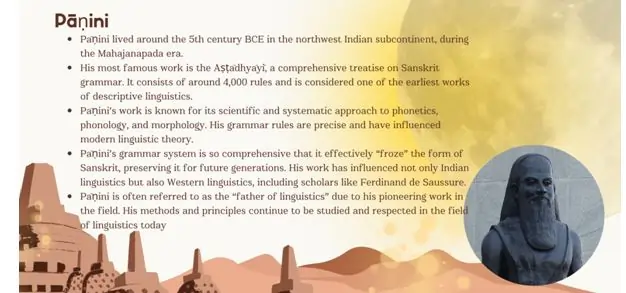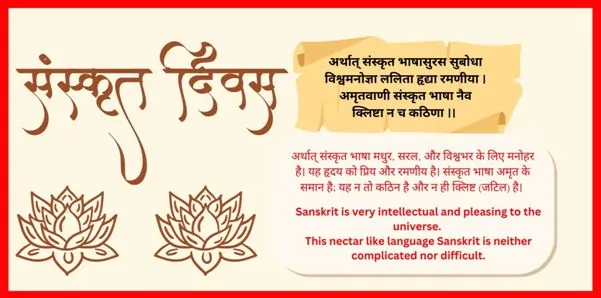On the Full moon day of the Shravan month of Hindu calendar Sanskrit day is celebrated.
Sanskrit Day is observed with an intention of recalling the traditions of the Indian
language, culture, civilization and wisdom. Celebration of Sanskrit Day is with the
intention of awareness about the significance of Sanskrit language and its glorious
history and future, also to maintain and spread it. Sanskrit is considered as mother
of languages, it was the primary language for ancient Indian texts. Several literary,
educational and cultural programs are arranged on this day.
These programs are Sanskrit drama, Kavi sammelan, speech competition and seminars. The celebration of this day is to increase consciousness of the people about the necessity of Sanskrit language, along with the motivation of the young generation to learn Sanskrit language. Celebration of Sanskrit Day is an important premise to sustain the Indian values, epics and classics in the global sphere.
Historical Perspective:-
It was first celebrated in the year 1969. During this year instructions were provided to the state governments and central Institutions to observe the day as the Sanskrit Dayby the Ministry of Education of the Government of India. This day is observed to commemorate the birth anniversary of the great eminent Sanskrit scholar and grammarian of India name Panini. This has been strictly selected to popularize the importance of Sanskrit in Indian culture and literature. Sanskrit is an important language due to its past and literature background. Its structure and vocabulary has paved way or has some or the other relation with the genesis of many of the other Indian languages. This day aims at the conservation and propagation of Sanskrit as well as to promote the language among the teachers, students and masses, so as to popularize this great language among the youngsters of India.

Objectives of Sanskrit Day: —
Some of the main objectives of Sanskrit Day are as follows:
- For the continuity of age and incomparable value of Sanskrit language and to explain its necessity.
- To popularize Sanskrit language so that different features of this language might be investigated in proper methodological ways.
- In particular, using the information contained in texts, to reveal the literary works, philosophical and spiritual works, as well as cultural value of Sanskrit and its significance in modern society.
- To bring on the newer generation towards it so that they get to know about our ancient culture and tradition.
- To propagate India’s regional languages and their dialects through Sanskrit and to explain the reason why these languages should be preserved.
With these campaigns, the general public will be prompted on the use of Sanskrit language so that this language can be popularized among the people.
Major activities on Sanskrit Day:
- In institutions: On this day different competition programmes like the Sanskrit dramas, Kavi Sammelan and speech competitions are conducted in schools, colleges and other Sanskrit Bhavans. In such events, students and scholars participate to strengthen this event."
- Workshops and seminars: Lectures and discussions on Sanskrit as a language are conducted in educational institutions, the main activities of which are studying-teaching and scientific activities in Sanskrit.
- Book fairs: In addition, other activities like display of manuscripts pertaining to Sanskrit literature, book fairs and functions to honour Sanskrit scholars are also arranged. More importantly in such celebrations, distinguished scholars who have done much in the defence and enhancement of Sanskrit language are recognized and rewarded
- Social Media Campaigns: For the similar reasons, a social media campaign (like on Twitter, Facebook, Instagram etc.) is created in every sector of the society on Sanskrit day so that it becomes a language well known to people.
Why we celebrate Sanskrit Day:
Below are some of the reasons why we celebrate this day:
- Historical:Sanskrit is one of the oldest languages of the world which has its literary and philosophical system. The preservation and promotion is required so that this language does not turn into some lifeless language that is no longer spoken.
- Culture:Sanskrit language is one of the richest and oldest languages of India and a part of India’s culture and civilization. It is in this way understanding and conservation is able to be made towards over Indian cultural heritage, for future generations.
- Scripts:The Vedas, the Upanishads, the Puranas are said to be the literature that has been written in the Sanskrit language. It is with reference to this language that one can easily make access to old and knowledge enhancing material.
- Mother to all:it is considered as the mother of all languages groups. It is celebrated in order to promote unity and diversity among different language spoken in India.
The significance of Sanskrit Day

- It is an important constituent of the totality of Indian culture, literary and philosophical thoughts. Sanskrit Day makes people understand how crucial it is to do something to save the language and keep it meaningful.
- Sanskrit is the most fundamental and important pillar of India civilization. This is easily seen from its literature and religious scriptures that it has distinct Indian influence, taste and ethos. The essence of this day is therefore to celebrate and continue to preserve this culture as part of our ethnic values.
- Sanskrit language is useful for comprehension of anteriority of the Indian knowledge systems owing to the fact that study of this language makes it easier to understand the great amount of knowledge that originated from India. It is the language of Vedas, Upanishads and other sacred scriptures, which contains prime information regarding numerous aspects of life.
- Sanskrit Day as an event is useful as it helps the participants introduce Sanskrit and its role in society and culture to other people. Sanskrit has actually benefited from it and has encouraged the younger generation to embrace it as a language to be learnt and used.
Challenges: Sanskrit language has lot of problems in its preservation and spreading. One can do analyse from the below points about challenges associated to it:
- The greatest difficulty is the way Sanskrit is practically almost absent in the contemporary world and thus must be made dominant again.
- Other current languages along with English have become more significant and the significance of Sanskrit has almost vanished. In the light of such a scenario, it becomes highly challenging to keep Sanskrit as a language going.
- The absence of the necessary resources and qualified teachers needed for the education of Sanskrit language is also an equally factor.
- Low resource availability is a major issue in the institutions related to the Sanskrit language. Such a lack does not permit the existence of Sanskrit language and widespread its knowledge.
Efforts by the Government: —
- Education reforms: reforms in which the Sanskrit has been taken as a full-fledged subject to teach among the schools and universities.
- Institutions:government is working on establishing new institutions and designing new curriculum for Sanskrit language.
- Scholarships: in other related efforts of the government, special grants and scholarships have been organized to push its advocacy for the subject. For example grants are provided for the purpose of editing and reprinting of the Sanskrit texts.Several programmes are also conducted to felicitate the scholars and teachers in the field of Sanskrit and to appreciate their work
- Going Digital: for enhancing its compatibility with the newly emerging digital era, there has been an effort from the government of India to put the Sanskrit literature and study material in the online domain. Under this, development of various digital libraries and online resources is being done.
- Committees:some special committees are established. They have the binding to give recommendations on the new formation and education related to the Language.
Suggestions: —
- Sanskrit should be made a part of the subject in schools and colleges. For this, it is needed to develop the new type of the curriculum, as well as to attract the trained teachers.
- Sanskrit can also be taught through other modes of education including; online and distance education.
- More specifically, projects and competitions should be developed with an aim of creating interest among the youthful generation towards Sanskrit. For instance, essays, poetry and speech writing competitions can be incorporated in the teaching of Sanskrit.
- The texts of the literary languages of Sanskrit should be published or uploaded to websites. Thus, one can have specific web interfaces and applications to be designed in such a way that the effectiveness and the usage frequency of Sanskrit among people will be enhanced.
- To enhance the identity of Sanskrit at international level ‘cooperation with international organizations and universities should be enhanced’. By which the study-teaching and research of Sanskrit will get international recognition.
Conclusion: —
Sanskrit day is one of the great steps to honour, protect and popularise the Sanskrit language and its rootedness. It is celebrated with the intention to focus on this ancient language which is the root of Indian civilization and for the conservation of its literature and knowledge. There are certain issues that hinder preservation and promotion of Sanskrit They include; Present day concerns, illiteracy and inadequate access to resources. To address these challenges, what is required is social awareness, documentation and dissemination of education and resource and social support. Thus, it is undeniable that through Sanskrit Day, the rationale of the sanctuary of Sanskrit language can be accomplished and first and foremost, an opportunity to keep Indian culture alive.